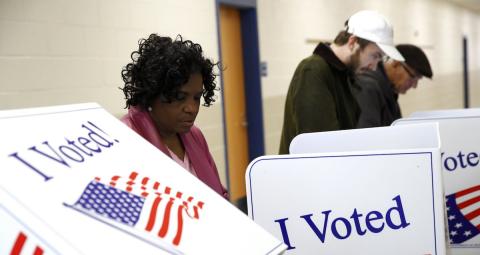Editor's Note: This op-ed originally appeared in the South Florida Sun Sentinel and has been republished in its entirety with permission from the author.
This November, Florida voters have the chance to expand the voting rights of all registered voters by supporting “All Voters Vote” — Amendment 3.
As a Black woman and a physician who grew up in the social isolation of poverty in the Black community of South Philadelphia, I support Joe Biden’s decision to choose Kamala Harris as his running mate. She is a woman of color and a talented politician. And as she said at her announcement, she stands on the shoulders of women of color who came before her.
Sen. Harris is a Democrat elected to the U.S. Senate in California’s “top two” open primary system and is the visible product of an inclusive and democratic system that allows new leaders to rise to the top. This puts her in a unique position to demonstrate the benefits of an election system in which all voters — including independent voters like me — have full and equal rights.
Amendment 3, which is on the Florida ballot this November, will establish an open, primary for state offices, ending the exclusion of 3.5 million independent voters — including hundreds of thousands of people of color — from voting in primaries. This system is not new. It is currently used throughout Florida for municipal and many county elections.
After it was enacted in California, the Black legislative caucus grew by 50%, the Latino legislative caucus grew by 25%, and voter approval of the legislature grew from 14% to 42% — all in just eight years. It’s a system that is fair to everyone, empowers communities of color and allows all voters to vote for any candidate. Prominent civil rights attorneys, including Michael Hardy, the executive vice president of the National Action Network, believe that open primaries are the next chapter in the fight for voting rights.
But in Florida, scare tactics are circulating. Political operatives are telling Black voters that if the closed primary system is reformed, Black people will no longer be elected. This is false. It's merely the latest attempt to lock Black voters into place and prevent us from maximizing our political power.
The truth is that nonpartisan primaries enhance our power. It opens up the process and creates possibilities for new candidates, new coalitions and new leaders to thrive. That’s why young African American elected officials Rasheen Aldridge, Michael Butler, Tishaura Jones, and Marty Joe Murray Jr. are building a multi-racial coalition to enact nonpartisan top-two primaries with approval voting in St. Louis this November.
In Chicago, a top-two nonpartisan system propelled two Black women to the general election and then put Lori Lightfoot in City Hall. The number of people of color elected in California — including Kamala Harris — soared after closed partisan primaries were abolished there in 2010. 35% of African Americans under the age of 30 now identify as political independents. Shouldn’t we fight for a system that allows all Americans — and all Black people — to fully participate?
Supporting Joe and Kamala does not mean that we should ignore ways that the Democratic Party does stifle the full participation of the African American community. Yes, the Republican Party has taken the lead when it comes to voter suppression, disenfranchisement, punishing former felons, closing primaries and gerrymandering. But both parties protect their control of voters.
When the Republican Party sued to kick Amendment 3 off the 2020 ballot, they were joined by the state Democratic Party. And when closed primaries became an issue in the Democrat’s 2016 presidential primaries, young people of all races demanded that the party change its rules to allow independents to vote. But the party establishment opposed those changes.
I’m supporting Amendment 3, and I hope you will too. No one should be required to join a political party in order to vote, and no one should be punished for refusing to do so. The Black Lives Matter movement has inspired a new generation of activists making new demands for racial justice. It’s time for a new generation of Black leaders and voters to establish a new set of rules for exercising political power as well.
